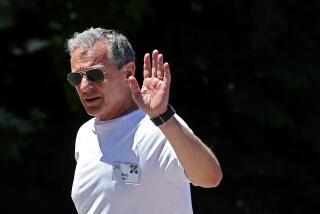Reed Dispels NYSE Shakeup Rumors
- Share via
NEW YORK — Far from seeking wholesale resignations from the New York Stock Exchange board, interim Chairman John S. Reed on Monday said that he regretted that two directors already had quit and that he was encouraging others to stay on until a new governance “architecture” is in place.
Reed, on his first official day on the job, told reporters he unsuccessfully tried to talk lead director H. Carl McCall out of resigning last week and would like to have headed off the departure of DaimlerChrysler Chief Executive Juergen Schrempp over the weekend.
Critics have been clamoring for some or all of the board members to step down in the wake of the controversy surrounding former Chairman Richard Grasso’s compensation. However, Reed said he could benefit from the directors’ experience in educating himself about the problems that led to Grasso’s forced resignation Sept. 17, which he called “an embarrassment” for the exchange.
In a wide-ranging, hourlong news conference at the NYSE on Monday evening, Reed also said the Big Board’s next leader certainly would not be paid anywhere near the amount that Grasso received -- an annual salary and bonus that peaked at more than $30 million in 2001.
Reed said he wasn’t yet sure of the appropriate level of pay, but “clearly to compare the job of the chairman of the New York Stock Exchange with the chairman of Goldman Sachs doesn’t make any sense to me.”
The 64-year-old former co-chairman of Citigroup Inc. said he called the news conference partly to dispel what he said were misleading reports about his plans for the Big Board.
Reed said, for example, that it would make no sense to scrap the work of the NYSE special committee -- headed by McCall and former Clinton administration chief of staff Leon Panetta -- that has been preparing a report for the Securities and Exchange Commission on proposed corporate governance reforms. He said the panel’s first draft didn’t go deep enough in addressing the problems, but he had confidence that the project was on the right track.
Public officials and stock market professionals alike have blasted the NYSE’s board for conflicts of interest. For example, many of the directors who approved Grasso’s pay run companies that are regulated by the exchange or have stock that trades on the exchange.
While acknowledging the problems at the top of the management structure, Reed said the NYSE remained “clearly the best exchange in the world.” Therefore, he said, what people should expect from his temporary leadership is “profound changes with regard to governance, no significant changes to operations.”
Some would-be reformers have suggested that the NYSE concentrate on running the market and leave its regulatory function to an independent outside entity. The Nasdaq stock market has moved in that direction, as have many overseas exchanges.
But Reed was cool to the idea.
“We are a good regulator,” he said. He called the regulatory capability “an asset” that helps “position the exchange as the gold standard.”
More to Read
Inside the business of entertainment
The Wide Shot brings you news, analysis and insights on everything from streaming wars to production — and what it all means for the future.
You may occasionally receive promotional content from the Los Angeles Times.










